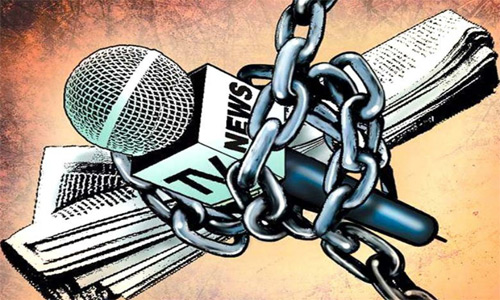When we discuss about freedom, various types of freedom come in our mind including freedom of religion, freedom of thoughts, freedom of belief, freedom of speech, freedom of the press, the right to assembly and the right to petition the government, but the freedom of expression seems to be a corner-stone to all types of freedom. According to the preface of universal human right declaration, freedom of expressions is deemed as the highest aspiration of mankind and ideal condition considering as core criteria for a pluralistic society. The reason is it reinforces all other human rights, allowing society to develop and progress. The ability to express our opinion and speak freely is essential to bring about change in society. It plays a vital role in informing citizens about public affairs and monitoring. Freedom of Expression is closely linked to freedom of the press and freedom of thought because it includes both the right to speak and the right to be heard. Additionally, it is an indispensable requirement for society to be free of oppression or coercion, e.g. economic compulsion in a society. However, there are some logical limits about freedom of speech which are rooted in the principle that we’re not allowed to harm others to get what we want. That’s why we’re not allowed to use to speech for force, fraud, or defamation against others. Given the abovementioned points about importance of freedom of expression, Afghanistan seems in a good status in term of media freedom comparing to regional countries. Indeed, it is one the greatest achievements of post-Taliban era. According to article 34 of the Afghan Constitution states that “Freedom of expression is safe from attack and every Afghan has the right to express his or her opinion by speech, writing, image or other means, in accordance with the provisions of this Constitution.” Every Afghan has the right to publish and distribute material in accordance with the provisions of the law without prior disclosure to government officials. The law shall apply to the law on broadcasters, radio, television, the press, and other types of media. On account of this context, today the country has hundreds of print media, tens of television stations, hundreds of radio stations and dozens of news agencies. In line to this commitment, Afghanistan has recently joined the Global Coalition for farther Promotion of Freedom of the Media. In a ceremony marking the occasion, the second vice president, while signing the commitment document on behalf of the Afghan government, emphasized that freedom of expression and freedom of the media is one of the achievements of the Afghan government and people and it is deemed as our red line. He said, “Though there were some concerns over the abolition of freedom of expression, but the Afghan government is committed to protecting freedom of expression and freedom of media and will never allow anyone to undermine this great achievement.” Despite numerous problems in the country, fortunately there is not much problem in terms of freedom of expression and media freedom. In recent years, the national unity government has had repeatedly showed its commitment about implementation of article 34 of the Afghan Constitution about freedom of expression. The government proceedings consist of ratification and modification of media law, enact and ratification of free access to Information Act, establishment of accessing commission to Information, establishment of joint government and media committee, investigating more than a thousand cases of violence against journalists and timely investigation of all these cases. Fortunately, there is no censorship in Afghanistan, and no journalist is in prison for his career. These are the biggest gains the Afghan government comparing to other countries in the region. In terms of freedom of expression, it ranks very well and could be compared to the developed countries.
Nevertheless, there are some problems, especially in the area of violence against journalists which mainly imposed by terrorist groups or some government entities due to a lack of culture of accountability or ignorance of their responsibility but the entire legal and administrative infrastructure have been created for media freedom. In the same way, there seems enough motivation and a serious will to improve the situation. Now that Afghanistan considered as a pioneer country in the region in terms of freedom of expression, the acceleration of peace process with the Taliban has raised some serious concerns in the country. For example, one of the most important concerns which caused a lot of controversies in the country was the term of “ Islamic Emirate” in the draft agreement between the US and Taliban, but happily it was aborted by a single Twit.
Unfortunately, the new Qatar talks with Taliban once again raised the concerns in the country. It is speculated that again “Islamic Emirate” would be mentioned in the US-Taliban agreement while this kind of approach with peace process have created lots of pessimism about peace process in the country. Indeed, it has negatively changed the view of public opinion towards peace process which is led by foreign countries, specifically the United States. Acknowledging the existence of the “Islamic Emirate” is an act against the existing constitution and the recognition of a political system that is fundamentally opposed to freedom of expression and human rights values. Undoubtedly, such an agreement will undermine the freedom of expression and freedom of media, human rights values, women’s freedom and their education.
Therefore, Joining the Global Press Freedom Coalition is a Good step towards Freedom of Expression in Afghanistan and it must be welcomed by the media community and free men of this country. This step will ensure the implementation of freedom standards and values reflected in the national and internal law. More than any other group in the country, the media community should support such proceedings and reflect any probable threats that might be imposed by the ongoing peace process.
Home » Opinion » Joining GPFC a Big Step towards Freedom of Expression
Joining GPFC a Big Step towards Freedom of Expression
| Mohammad Zahir Akbari

